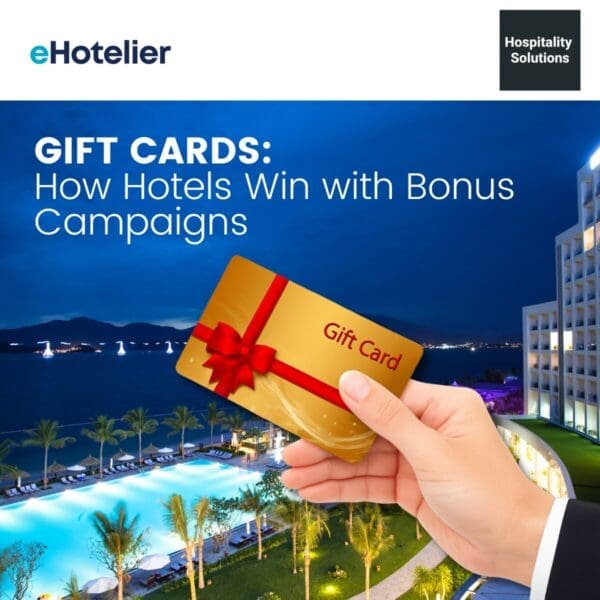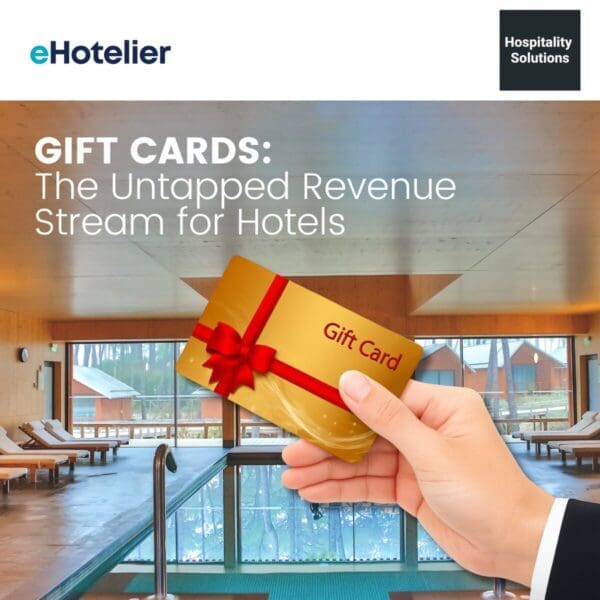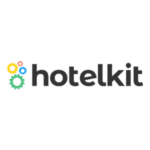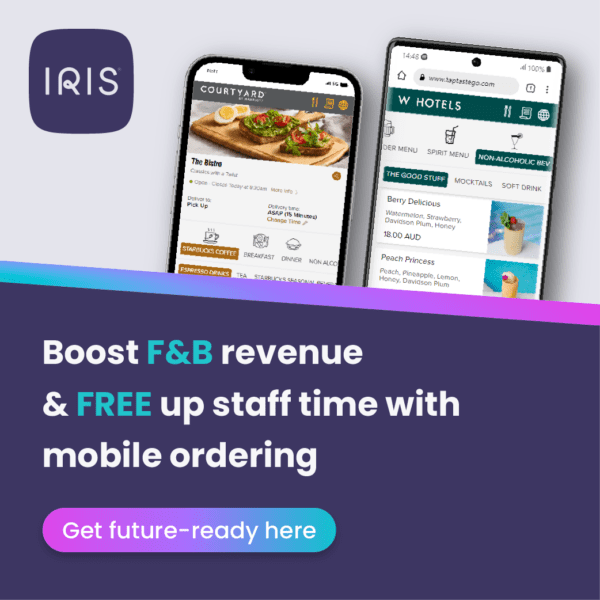 There’s a vacation marketing opportunity that hoteliers need to be aware of based on traveler apprehension. People don’t typically associate vacations with dread but it’s there with each and everyone, particularly during the holidays—not when the vacation is being planned or even when it’s started, but as the end of it is approaching.
There’s a vacation marketing opportunity that hoteliers need to be aware of based on traveler apprehension. People don’t typically associate vacations with dread but it’s there with each and everyone, particularly during the holidays—not when the vacation is being planned or even when it’s started, but as the end of it is approaching.
The vacationers are somewhere new or sentimental (like the neighborhood where they grew up). Their day-to-day life is on pause. They catch up with what they’ve wanted to do all year, or they just do nothing, lie around, and relax, hanging out with friends and family. Yet, in the back of their mind, as their vacation and the holidays come to an end, they know “real-life” is about to start again. The pit in the stomach subconsciously grows as the days of the vacation tick off, and they must soon return to what their life was like before this vacation.
According to the National Alliance on Mental Illness, 64% of people report being affected by holiday depression. This pit-in-the-stomach feeling is manifested through an amalgamation of symptoms ranging from insomnia, low energy, and irritability to lack of concentration, and anxiousness.
The best way to counteract the post-vacation blues is to book another trip! This is where the Annual Sale comes in.
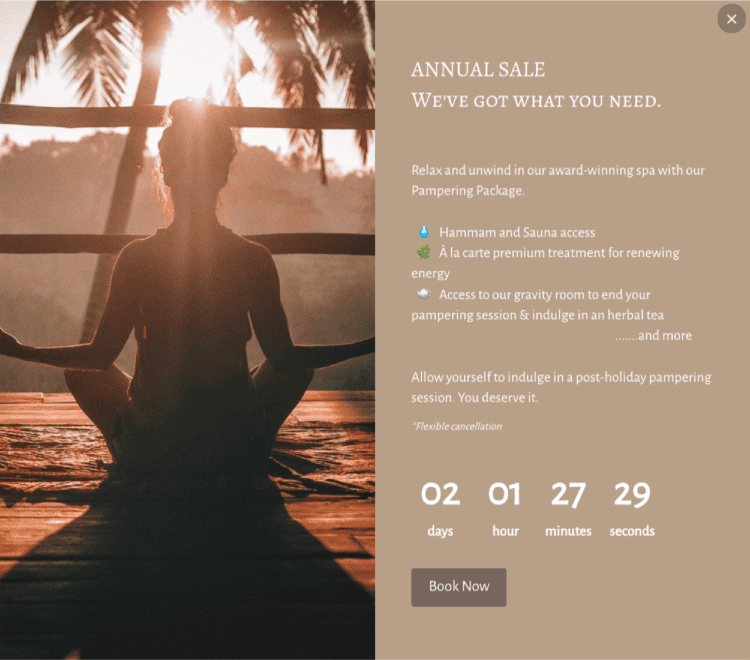
There is a high likelihood that people experiencing these symptoms may not understand why they are experiencing these feelings, so they don’t understand the best way to alleviate them. And herein lies the opportunity for hoteliers. If they think about the customer journey of booking a hotel, it typically starts with the dreaming, funnels down to consideration, and filters down to a decision. Ultimately, just as the guest journey comes to an end, so does the buyer’s journey. Where does the inspiration start? Influencers? Friends? Bucket lists?
Most leisure trip bookings outside of the normal holiday periods are typically based on needs (wedding/moving/attending to family/visiting friends). There are only specific times of the year when people think they should book a holiday based on the available deals. Hotel marketers are trained—as are bookers—to buy during finite times throughout the year, such as the shopping days marketed like Black Friday, Cyber Monday, Valentine’s Day, and the various Hallmark holidays. These are holidays where people think about buying gifts for someone they love. They are looking to surprise, delight, and treat them to something special. Therefore, hotels need to create a trigger for individuals to purchase a trip for themselves, particularly as their end-of-year vacation ends.
Hotel marketers need to associate this new purchase trigger by tapping into an existing one. Hoteliers can assuage the post-holiday angst by promoting an Annual Sale tied to the New Year Resolution. The messaging should focus on wellness and reiterate the importance of self-care with a strong call to action to “Just Book It.” By leveraging an existing and well-known universal wellness proclamation, the New Year’s Resolution, hotel marketers can create an entirely new purchase trigger.
Hotels must seize the opportunity to associate themselves with this annual ritual of New Year when travelers are most self-reflective. By associating the Annual Sale with the New Year Resolution (27% of Americans make them), it grants travelers permission to treat themselves to a wellness break and spend the money to succeed in achieving their resolutions. Though only 8% of people typically keep resolutions, the intention to keep them is there (particularly early in January). If hotels act quickly, they can capture future guests’ desire to improve themselves.
There is an additional challenge of pushing a new sale at the end of the vacation: Typically, a lot of money has been spent on transportation, lodging, food, and other forms of entertainment. Therefore, people aren’t in the frame of mind to spend even more money on the next vacation. This is why hotels need to make it very palatable and easy for the person to book during this period, with incentive-laden discounts, flexible cancel policies, and something that just doesn’t seem like another significant charge on the credit card.
What should be some of the elements of the annual sale?
- wellness, calling out hotel amenities (fitness center/spa/yoga) with package wellness items (meditation) from local partners
- healthy food and beverage opportunities
- language in the copy that gives the person permission to spend money on a vacation for themselves
- images that are inspirational and experiential
- deep discounts
- bonus incentives if they are one of the first to book
- flexible cancelation policy
- very limited in time: just from New Year’s Eve to January 10th or the closest Sunday
- urgency via the scarcity of inventory
Wellness messaging: Hotels should be ready to deliver inspiration-related promotions, showing experiences focused on relaxation and freedom outside the hotel. Inspiration should be traveler personalized, whether it’s the solo, couple, or family traveler. Meditation should be a vital component of any package. Moreover, since healthy eating and dieting are always within the top three resolutions, the hotels should offer healthy food options and perhaps have an expert on hand to advise on easy ways to follow a healthy diet.
Flexible cancellation: If the annual sale is an impulse purchase, there is a better chance it will be booked if there aren’t any penalties. Therefore, hotels must remove any advance purchase penalties for cancellations related to these promotions. Flexible cancellation is one of the essential components of the booking.
Trip stacking: The pandemic is creating vacation uncertainty. When booking a trip for the future, the traveler does not know for sure if a country’s border will be open or even if certain hotels will be open. To address this new uncertainty, travelers create travel certainty through trip stacking. The actual definition of trip-stacking is booking two or even three trips over the same travel period in case Covid-related problems ruin their preferred plans. Trip stacking is essentially creating vacation plans A, B, and C. For example, a person might book an international trip, a domestic trip that requires a flight, and a staycation. Knowing the traveler may do this, the hotel management company or brand can offer discounts or incentives to book multiple trips during the same period. While the specific hotel will only be assured to get one of the bookings made, it provides the guest with a new choice based on the uncertainty of the ongoing pandemic.
How Can The Hotels Network Help Hotels with the Annual Sale?
The Hotels Network can help drive the execution of the Annual Sale by driving direct bookings and boosting website conversion rates. This implementation can be done via messaging, personalization, targeting, urgency nudges, and form content collection.
Website Messaging: The Hotels Network’s Smart Notes & Layers allow the hotel to use their images or one of THN’s 2 million hi-res images to showcase the relaxing experience guests can anticipate if they book the hotel. Due to its highly flexible design, the messaging will always look on-brand, leveraging their library of over 1,000 fonts and following the brand style guide to the exact hex color tint.
Targeting book/stay dates: The entire website campaign can be created before the holidays and deployed to focus on specific booking and stay dates. For this particular Annual Sale, it is recommended to be scheduled during the first ten days of January: January 1 – January 10th.
Countdown timer: This timer can create urgency associated with the booking period associated with the Annual Sale.
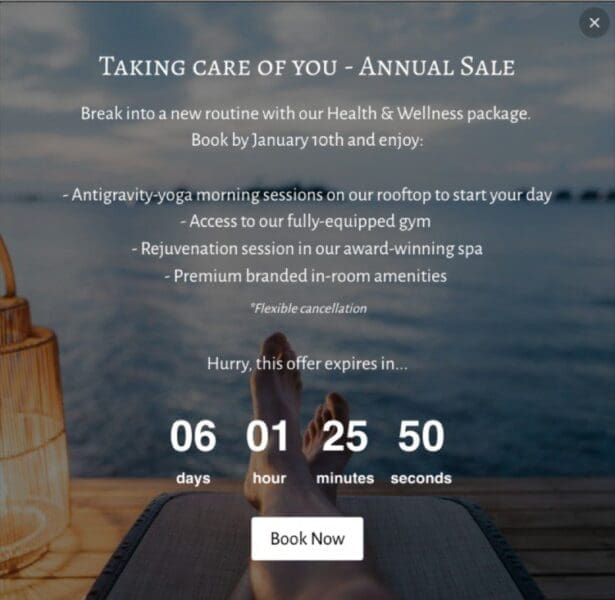
Personalization based on travel party: When the booker opens the booking engine and picks the number of guests, the personalized messaging can adapt to the selection. If it’s a solo traveler, a couple, or a family, the images, headline, and copy will reflect what is selected.
Urgency nudges: Subtle notes launched in the booking engine indicating the number of people looking at the promotion and the number of rooms left at a particular price and on a specific date.
Messages & Forms Together: Messages & Forms can easily facilitate trip-stack messaging. After a booking is completed, a message can appear on the confirmation page asking the traveler if they would like to book another trip for the same period to guarantee they will be able to get away during their vacation period. The form will be used to collect their information to be passed along to the outbound contact center.
Exit Intents: If someone is thinking about leaving your website without making a booking, a message can be displayed indicating that cancellations are hassle-free. For hotels during this Annual Sale period, the cancellation policy should remain flexible for the trip-stacking reservations, but the “cancel by” dates should be pushed out to a week before arrival so that the hotel doesn’t end up taking an occupancy hit.
As the holiday vacation draws to an end and people are experiencing symptoms of insomnia, low energy, irritability, difficulty concentrating, and anxiousness, there is now an understanding of the causes. It is the hotel marketer and not the doctor that has a cure for these post-holiday blues.




